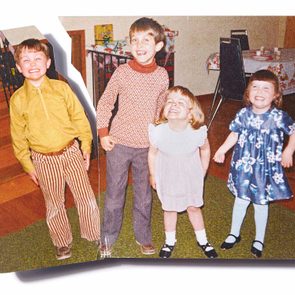New research flips the script on sibling stereotypes—here's what you need to know

Attention, Middle Children! Here’s Why You’re Better Than Your Siblings, According to Science

Confession: I once forgot my second son at the gym. He was 4, safe in the child care center (no children were harmed in the making of this family lore!), but somehow my husband and I each thought the other had grabbed him. We made it home with our first and third sons—completely unaware. The worst part? We didn’t notice until the gym called. I raced back in tears to find my precious middle child happily eating a popsicle, blissfully unaware of the whole ordeal. He was fine. I wasn’t. I berated myself for days. How did this happen?
Was it because … he is a middle child?
If you’re a middle child or just know one, you might have heard a million versions of “Marcia, Marcia, Marcia!”—the universal rally cry of overlooked middle children everywhere. We’ve all been led to believe that the middle child is doomed to a lifetime of invisibility, stuck between the bossy firstborn and the doted-on baby of the family. But according to a surprising new study, it turns out the middle sibling might just be the secret superstar of the family.
Yes, you read that right. Not only are middle children not doomed, but research suggests they have an important advantage over their older and younger siblings due to two very specific traits. While firstborns and youngest children battle it out for attention, middle kids quietly develop skills that just may give them an edge.
Read on to find out which traits we’re talking about and how this may affect middle children over the course of their lives. Middle children—and parents of middle children—you know you’re curious!
Get Reader’s Digest’s Read Up newsletter for more news, humor, cleaning, travel, tech and fun facts all week long.
How were middle children evaluated in the study?
The researchers asked 770,000 adults to fill out the HEXACO Personality Inventory, a survey that measures people on six key personality traits: honesty-humility, emotionality, extraversion, agreeableness, conscientiousness and openness to experience. They then tabulated the data based on their birth order—whether they were an only child, the oldest child, a middle child or the youngest child—along with how many children total were in their family. So this wasn’t a study just on middle children, per se, but the data revealed some particularly interesting information about them.
Why are middle children “better” than their siblings?
According to the study, middle children may be more well-adjusted than their siblings. “Middle-borns averaged highest in two personality dimensions—honesty-humility and agreeableness,” according to Kibeom Lee, PhD, a professor of psychology at the University of Calgary and one of the lead authors of the study. “Only children averaged lowest, and ‘oldests’ and ‘youngests’ [were] in between.”
“Honesty-humility” includes traits such as sincerity, ethical fairness, modesty and lack of greed, while “agreeableness” includes traits such as patience, gentleness, forgivingness and flexibility. They found that middle children possessed more of these qualities, making them better at getting along with others (no surprise there!) and better adjusted as adults.
“We wondered whether there is something special about being a middle child that tends to make a person become a bit higher in these traits,” says Lee.
Is it really about birth order, though?

That’s something Lee wondered: Was there something special about being a middle child that tends to make a person exhibit those traits to a greater degree? Not necessarily, according to his research—it may be more about the fact that middle children have a lot of siblings. “We found the effect is mainly just a reflection of how many children were in one’s family when growing up—what researchers call ‘sibship size,'” he says.
Remember: “Middles” are always from families with at least three children, whereas oldest and youngest children are in many cases from families with exactly two children; only children, by definition, are from families with one child. According to the research, people from larger families tended to be higher in honesty-humility and agreeableness. When Lee’s team compared people from families with the same sibship size, the birth-order differences became rather small, although middles and youngests still tended to be slightly higher in these traits than oldests did.
“What we think is probably happening is that when you grow up with siblings, there is a more frequent need to cooperate or share or take turns,” Lee says. “And this, in turn, leads to a slightly more cooperative personality.”
How do these characteristics affect the lives of middle children?
These above-average results likely translate only into small practical differences in adulthood. “As for the implications of these personality differences,” says Lee, “the differences probably aren’t large enough to have much impact on things like health, the kinds of spouses or the kinds of jobs that people from different birth orders or different sibship sizes will tend to have.”
That said, don’t let this stop you from humblebragging about your middle child status to your sibs. The difference may be small, but it’s still real!
But wait—what about Middle Child Syndrome?
Let’s bust the middle-child myth once and for all. Not only did middle kids succeed in life, according to the study, but the researchers found that there’s no downside to being a middle child, contrary to popular belief.
“In our personality data, we didn’t find anything to suggest any negative consequences of being a middle child,” Lee says. “There weren’t any desirable personality characteristics for which middle children had lower levels than oldest or youngest children did.”
Take that, Marcia!
How did older and younger siblings fare in this study?
One of the main findings of this study was that very few personality differences can be directly attributed to birth order. When there is a connection, it’s pretty small.
However, on average, only children scored highest on intellectual curiosity—something that replicates previous findings. “It appears that only children and, to some degree, oldest children in families with two or more children, develop slightly more intellectual curiosity as a result of having the undivided attention of their parents,” Lee says. “However, these differences are quite small, so again, many people are exceptions to these trends.”
It’s also worth noting that only children scored lowest, on average, in agreeableness and honesty-humility traits. This meshes with the study’s finding that the more siblings people grew up with, the higher their average scores on these traits.
What should parents do with this information?
For parents, the takeaway is clear: Don’t underestimate the middle child! While it’s important to recognize and nurture each child’s individual strengths, middle children can benefit from extra recognition and opportunities to shine on their own. Giving middle children responsibilities and encouraging their natural talents in diplomacy and empathy can help them build even greater confidence. And remember—while birth order may influence certain traits, it’s not destiny, Lee says. With the right support, any child can thrive, regardless of their place in the family lineup and their number of siblings.
One small suggestion he gives to parents of only children is to try to give your child some extra opportunities to cooperate and share and take turns with other children, such as cousins or friends.
So here’s to middle children everywhere, of all types and personalities! And extra cheers to my second son, who grew up to be an amazing adult with no abandonment issues whatsoever. (I hope.)
About the expert
|
Why trust us
At Reader’s Digest, we’re committed to producing high-quality content by writers with expertise and experience in their field in consultation with relevant, qualified experts. We rely on reputable primary sources, including government and professional organizations and academic institutions as well as our writers’ personal experiences where appropriate. We verify all facts and data, back them with credible sourcing and revisit them over time to ensure they remain accurate and up to date. Read more about our team, our contributors and our editorial policies.
Sources:
- PNAS: “Personality differences between birth order categories and across sibship sizes”
- Kibeom Lee, PhD, professor of psychology at the University of Calgary; phone interview, Feb. 5, 2025























